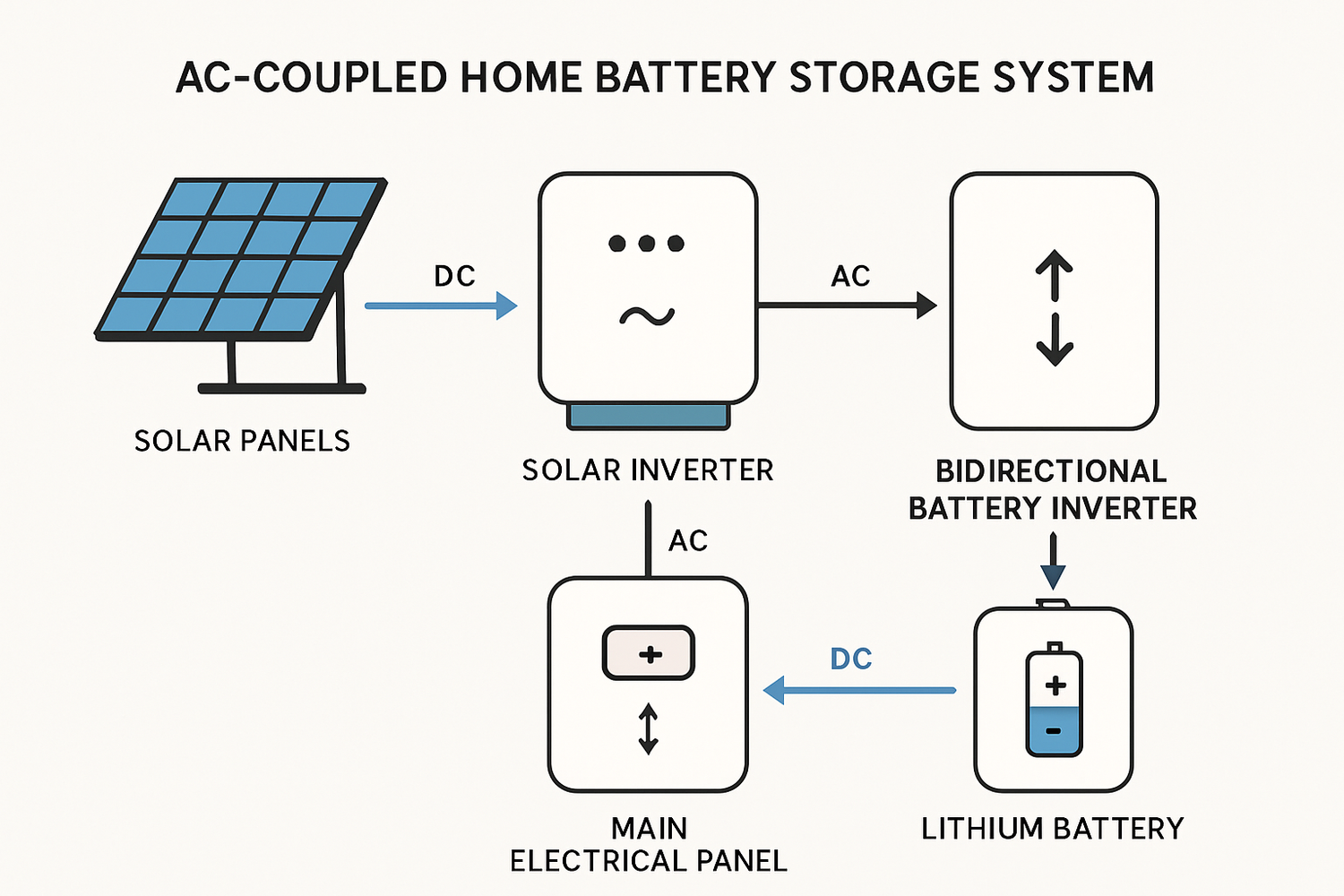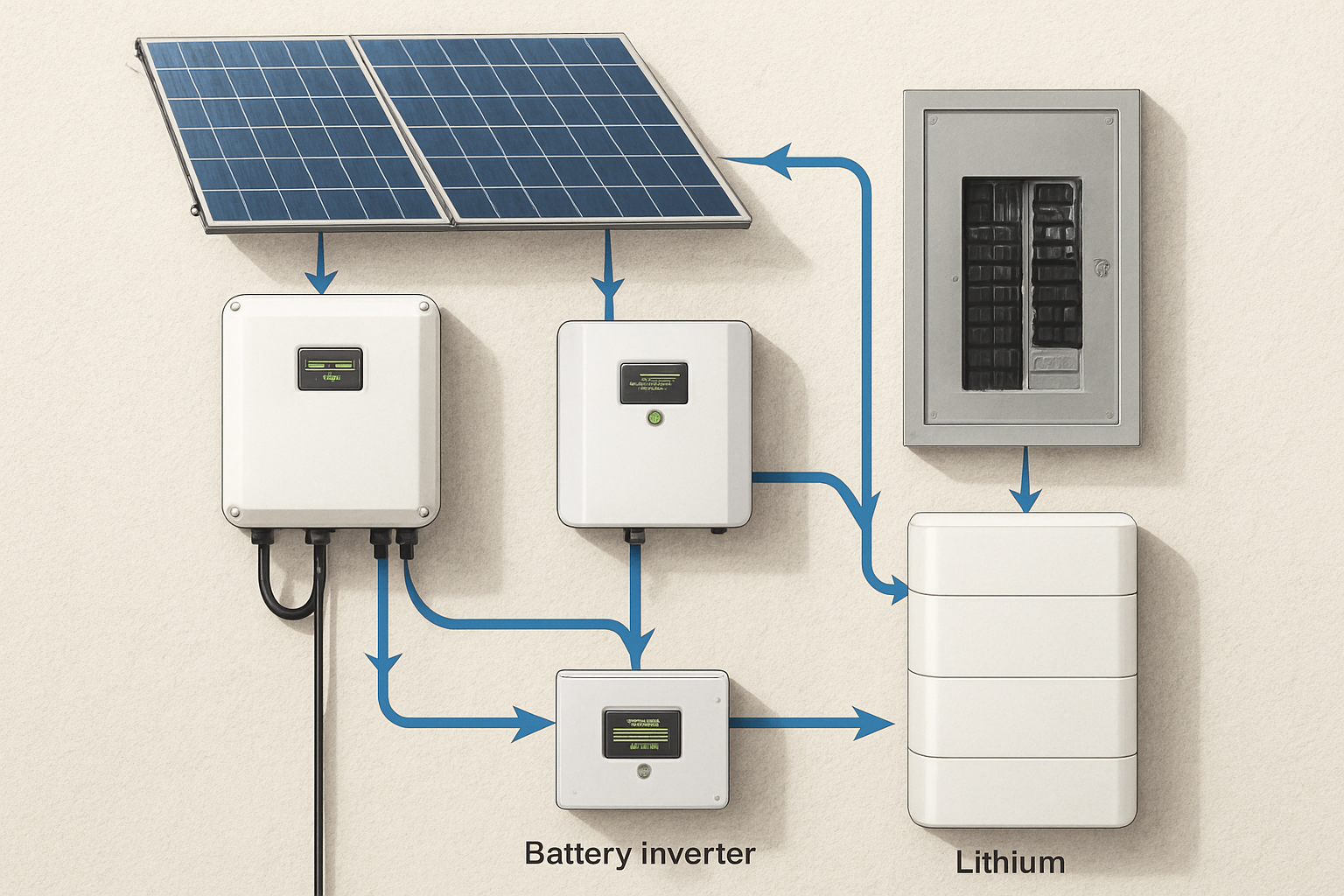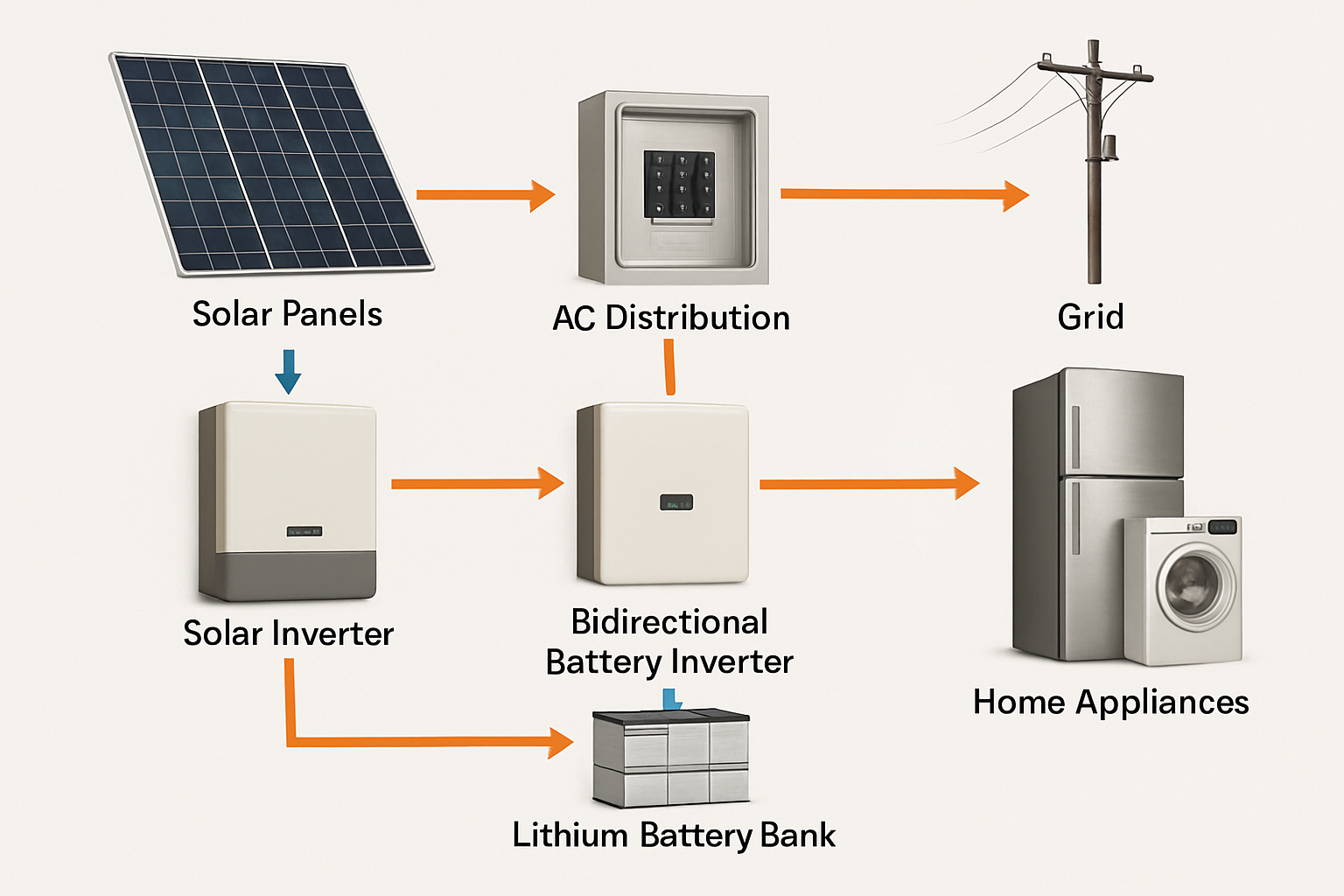Taking control of your home’s energy is more attainable than ever. With fluctuating utility rates and an increasing need for reliable power, a home battery storage system offers a powerful solution. It allows you to store the solar energy you generate during the day and use it whenever you need it, day or night. This capability is the foundation of true energy independence. For homeowners who already have a solar panel system, an AC coupled battery system is one of the most direct ways to achieve this goal.
Understanding the AC Coupled Battery System
An AC coupled battery system is designed to integrate seamlessly with existing grid-tied solar installations. Its design separates the functions of your solar panels and your battery, creating a flexible and efficient energy hub for your home.
Core Components and How They Interact
In a typical solar installation, an inverter converts the Direct Current (DC) electricity from your solar panels into Alternating Current (AC) for your home's appliances. An AC coupled system adds a second, separate inverter for the battery.Here’s how it works:
- Solar Panels & Solar Inverter: Your solar panels produce DC power. The existing solar inverter converts it to AC power for immediate use in your home.
- Excess Energy: Any unused AC power is sent to the battery system.
- Battery Inverter: A bidirectional battery inverter takes this excess AC power and converts it back to DC power to charge the battery.
- Discharging: When your home needs power (e.g., at night or during an outage), the battery inverter converts the battery's DC power back into AC power for your appliances.
This configuration allows the battery system to operate independently of the solar array, providing significant flexibility.
A Direct Path for Existing Solar Owners
The primary advantage of an AC coupled system is its simplicity for retrofitting. If you already have solar panels on your roof, you don't need to replace your existing solar inverter or rewire the connection to your panels. The battery and its dedicated inverter are simply added to your home's AC electrical system, making the installation process less disruptive and more cost-effective.
Strategic Advantages of AC Coupling for Your Home
Choosing an AC coupled system offers several practical benefits that contribute to greater energy resilience and control. This approach is particularly well-suited for upgrading an existing solar setup to include energy storage.
Seamless Integration and Installation
Because AC coupling works with your existing solar inverter, the installation is straightforward. A certified electrician can integrate the battery inverter and battery pack with your main electrical panel without altering your solar array. This modular approach makes it a popular choice for millions of homeowners looking to add storage capabilities to their solar investment.
Enhanced System Reliability and Backup Power
An AC coupled system provides an extra layer of reliability. Since the solar array and the battery have separate inverters, a problem with one does not necessarily disable the other. During a grid outage, the battery system can disconnect from the grid and power your essential appliances, creating a stable, independent power source. According to the U.S. Energy Information Administration (EIA), disruptions in electricity supply are a continuing concern, making reliable backup power a valuable asset for any home.
Scalability for Future Energy Needs
Your energy needs may change over time. AC coupled systems are inherently scalable. If you find you need more storage capacity, you can often add more batteries without needing to upgrade your solar inverter. This flexibility allows your system to grow with your family's demands, ensuring your investment remains valuable for years to come.
Key Performance Metrics for Your Home Battery
To maximize your energy independence, it's important to understand the performance of your battery storage technology. Certain metrics directly impact how much power you can store and use.
Understanding Round-Trip Efficiency
Round-Trip Efficiency measures how much of the energy sent to the battery is available for you to use later. Because AC coupling involves multiple energy conversions (DC to AC, then AC to DC, and back to AC), there are small energy losses at each step. While this may result in a slightly lower round-trip efficiency compared to some DC systems, modern battery inverters are highly effective. For a detailed breakdown of performance metrics, you can consult this comprehensive guide on solar storage performance.
Depth of Discharge (DoD) and Battery Lifespan
Depth of Discharge (DoD) refers to the percentage of a battery's total capacity that is used. Lithium Iron Phosphate (LiFePO4) batteries are a leading battery storage technology because they can handle a high DoD—often up to 100%—without significant degradation. This means you can use nearly all the stored energy. LiFePO4 batteries also offer a long lifespan, typically lasting for thousands of cycles, and are known for their thermal stability and safety.
Sizing Your System for True Independence
Properly sizing your system is critical. You need to balance your daily energy consumption, the amount of backup power you need during an outage, and your budget. A professional can help you analyze your electricity bills and solar production data to recommend the right size for your needs.
| System Size (kWh) | Typical Backup Scenario | Appliances Powered |
|---|---|---|
| 5 kWh | Evening peak usage / short outage | Lights, refrigerator, Wi-Fi, small electronics |
| 10-15 kWh | Overnight power / full day backup | All of the above, plus a well pump, microwave, or television |
| 20+ kWh | Multi-day outage / off-grid living | Most household appliances, including central AC (with management) |
Making the Switch: Practical Considerations
Transitioning to a home battery storage system involves a few key steps. Careful planning ensures your system delivers the performance and independence you expect.
Installation and Compatibility
While AC coupling simplifies installation, it's not a DIY project. Always work with a qualified and certified installer. They will ensure the battery inverter is compatible with your existing electrical system and that all components are installed safely and according to local codes. This guarantees system longevity and protects your home.
Financial Aspects and Incentives
A home battery is a significant investment, but one that can deliver long-term savings. By storing solar energy, you can avoid purchasing expensive electricity from the grid during peak hours. Studies from organizations like the International Renewable Energy Agency (IRENA) have shown a consistent decline in battery costs, making storage more accessible. Many regions also offer financial incentives, rebates, or tax credits for installing energy storage.
Disclaimer: This information is for educational purposes only and does not constitute financial or investment advice. Consult with a qualified professional before making any decisions.
A Smarter Path to Energy Self-Sufficiency
A home battery storage system is more than just a backup plan; it's a tool for managing your energy resources intelligently. An AC coupled system, in particular, offers a practical and efficient way for homes with existing solar panels to achieve greater self-sufficiency. By storing your own clean energy, you reduce your reliance on the grid, lower your electricity bills, and secure a reliable power supply for your home. It represents a meaningful step toward a more resilient and independent energy future.
Frequently Asked Questions
Can any solar panel system be upgraded with an AC coupled battery?
Most existing grid-tied solar systems can be retrofitted with an AC coupled battery. The key is compatibility between the new battery inverter and your home's electrical panel. It's always best to consult with a professional installer to assess your specific setup.
How long will a home battery last during a power outage?
This depends entirely on the battery's capacity (measured in kilowatt-hours, kWh) and your home's energy consumption. A typical system might power essential appliances for several hours to a full day. Larger systems can provide multi-day backup.
Is an AC coupled system less efficient than a DC coupled system?
AC coupled systems can have slightly lower round-trip efficiency due to the extra energy conversion step (AC to DC for storage). However, for many applications, especially retrofits, this small difference is outweighed by the ease of installation and lower upfront cost. According to the U.S. Department of Energy, typical round-trip efficiencies for modern lithium-ion batteries are very high, making the real-world difference minimal for most homeowners.





Leave a comment
All comments are moderated before being published.
This site is protected by hCaptcha and the hCaptcha Privacy Policy and Terms of Service apply.